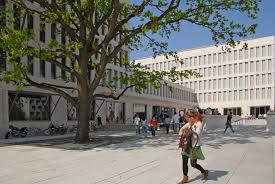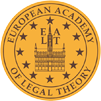 Students of the programme become acquainted with the fundamental principle and structures inherent to law as well as it's cultural, social, ethical, political and economic contexts. They will also familiarise themselves with the pluralistic network of legal systems on state, supranational and international levels, above all in integrated Europe. Courses in legal theory including the logics algorithms of law, the social and political philosophy of law, legal comparison, legal history and legal sociology including cultural studies of law are the main pillars of the Masters programme.
Students of the programme become acquainted with the fundamental principle and structures inherent to law as well as it's cultural, social, ethical, political and economic contexts. They will also familiarise themselves with the pluralistic network of legal systems on state, supranational and international levels, above all in integrated Europe. Courses in legal theory including the logics algorithms of law, the social and political philosophy of law, legal comparison, legal history and legal sociology including cultural studies of law are the main pillars of the Masters programme.
The programme analyses and engages with the ongoing globalisation and the connected structural transformation of normativity in law. Its focus is on:
- safeguarding European traditions as basis of constitutionalism for a global perspective.
- developing legal scholarship and jurisprudence as a science.
- developing jurisprudence also as applied legal theory so as to enable the participants in the programme to solve system conflicts that appear nowadays in a regular manner because national law is getting supra- and international and because of the growing weight of transnational law making by non-state actors.
This is reflected by the unique character of the programme and its excellent institutional setting on the new Westend Campus of the Goethe University:
- the programme is, in its exclusive concentration on legal theory, unique in the field of advanced legal studies in Europe, enabled by the university cluster of the European Academy of Legal Theory.
- it rests on synergies between three institutions located on the same campus: a large law faculty, the Max-Planck-Institute for European Legal History and the Cluster of Excellence „The Formation of Normative Orders“ that integrates the Frankfurt social sciences (anthropology, sociology and philosophy) focusing on normativity.
- the programme also connects the reputation of the Goethe University with that of other renowned European universities.
The law will be analysed by an international and renowned academic faculty in the context of culture, society, ethics, politics, economy, technology and globalisation. In addition to legal foundation courses, corresponding theoretical and technical competences will be mediated in modules on legal theory and jurisprudence; comparative law and internationalisation and on legal and cultural studies in law including legal sociology. Completion of the Masters thesis may take place during the summer months at the students’ own home university or at one of the partner institutions (universities and institutes of advanced studies).
In short
The comprehensive education of the Master programme is set in a European perspective. Europe´s legal systems and academic pluralism provide a huge variety of legal and academic cultures. This is most visible to spectators from overseas. Thus, this endeavor is a specific challenge to come to terms with a most complex association or union. Frankfurt´s Law Faculty and the partner universities under the EALT roof set up a programme governed by the principle of unity in plurality (or according to the EU´s motto “in varietate concordia”) thereby safeguarding the accommodation of diversity in a globalized world.
 This programme follows the Humboldtian ideal of education. It wants both professional training and broad education, “Ausbildung” and “Bildung”. Sound education has always been of personal nature. It is not only concerned of subjects but also of a cultural sensitivity and productive atmosphere. Accordingly, this programme goes along with a broad and international teaching body. Students will become familiar with leading scholars of jurisprudence and relevant doctrine in Germany, Europe, and Overseas.
The curriculum combines pure and applied legal theory. Students may pursue two types of career:
This programme follows the Humboldtian ideal of education. It wants both professional training and broad education, “Ausbildung” and “Bildung”. Sound education has always been of personal nature. It is not only concerned of subjects but also of a cultural sensitivity and productive atmosphere. Accordingly, this programme goes along with a broad and international teaching body. Students will become familiar with leading scholars of jurisprudence and relevant doctrine in Germany, Europe, and Overseas.
The curriculum combines pure and applied legal theory. Students may pursue two types of career:
- For a professional career, they return home or they look for new frontiers in Europe or even in Frankfurt, with opportunities mainly in banking and finance or in international law firms. Driven by globalization these firms pay increasingly attention to candidates with an LLM degree testifying a thorough expertise in speaking English and in handling intercultural matters.
- Pursuing the academic career they may stay in Frankfurt for a Ph.D. based on an individual agreement with a member of the teaching body. Or they participate in the partner Ph.D. programme of Glasgow, Louvain and Tilburg that takes account of the 60 ECTS of the Frankfurt LLM degree. In any case, a fine Master thesis is the point of departure for a doctoral supervision. In the end, participating in the programme means to be in the midst of an international legal theory research school providing a worldwide network of scholars and academic institutions.

